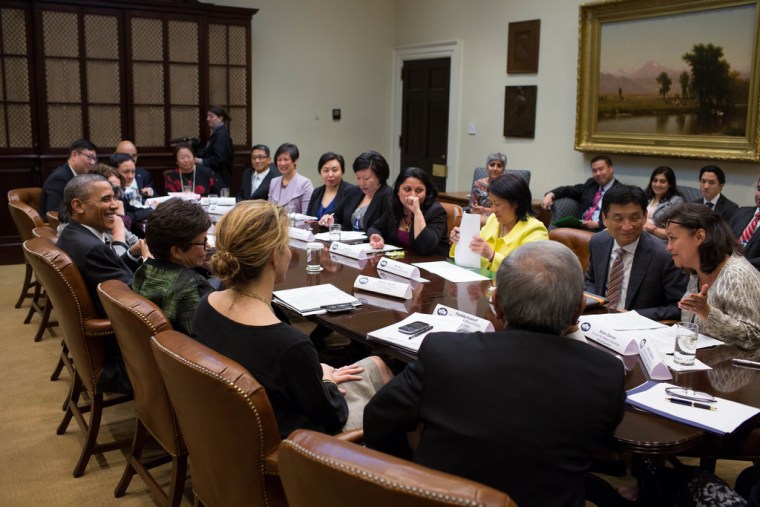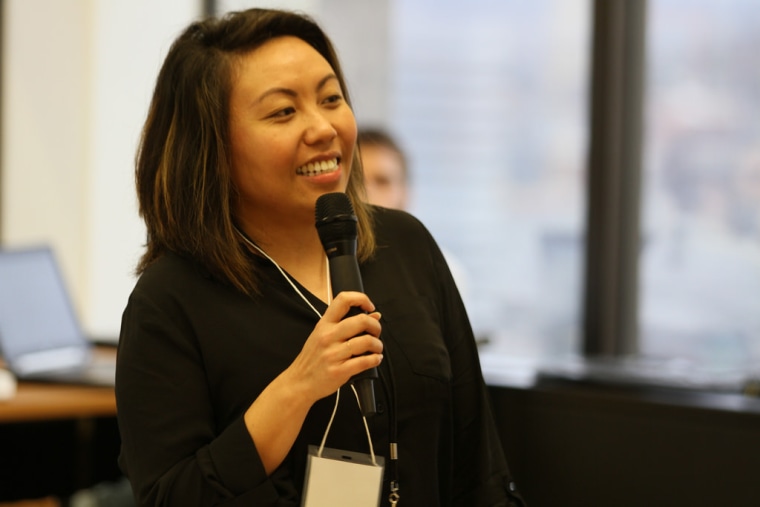When Doua Thor arrived in Washington, D.C., for her first internship, she never thought she would be where she is today.
“I barely left the Midwest, let alone could think that I would meet the President of the United States,” Thor told NBC News. “At that time, they were just launching the very first [White House Initiative on Asian American and Pacific Islanders (WHIAAPI)] under President [Bill] Clinton and I remember thinking, ‘That is an impossible place to imagine me being at someday.’”
Fifteen years later, Thor now serves as the executive director of WHIAAPI, an office that was first established in 1999 through an executive order signed by Clinton. (The initiative underwent a name change through the Bush administration, and was re-established as WHIAAPI by President Obama in 2009.)
RELATED: White House Hosts First-Ever Summit on Asian Americans
"We have long been a home for diverse communities and immigrants. It’s that tolerance, compassion, and acceptance of all that makes us strong."
Thor, who was born in Laos and fled as a child with her family to a refugee camp in Thailand, came to the United States in 1979. Her family was resettled in Detroit alongside Hmong refugees who also left their homes after supporting the U.S. during the Vietnam War.
Coming to Detroit, Thor said, was a jarring experience, but one that she says has been a constant reminder of the spirit and generosity that embodies the country that welcomed her and her family 35 years ago.
“Investment from this country allowed my family to come to the United States. My father was one of the many soldiers who supported the United States during the secret war in Laos. When we came to this country, it was a completely new experience. I still remember living in a small apartment and my dad walking to and from the hospital, because he worked as an orderly, multiple miles in the snow,” Thor said. “It really brought to the forefront the importance of having support from churches and social service organizations and the community.”
As a child, Thor also remembers the numerous times she acted as a translator for her family members, and later as a liaison to hospitals and court systems for Hmong families and for youth struggling to navigate various institutions.
That personal experience eventually led Thor to pursue a life of public service that has taken her from Detroit to DC, beginning with an internship at the Southeast Asian Resource Action Center (SEARAC) that she credits with changing her perspective on public policy work. “When I went to my first sociology course in college … I kind of first saw a light bulb,” she said. “I thought, ‘Oh you can study this?’ It’s been kind of my life story, which is that the environment and the place in which you’ve grown and your circumstances really make a difference in who you are.”
She added, “I really learned that the boundaries I had set for myself were all about my own experience and what I thought was only possible because of what I had experienced, but there’s so much more.”

Thor went on to serve as SEARAC’s executive director from 2004 to 2013 and, in that time, she was appointed to the President’s Advisory Commission on Asian Americans and Pacific Islanders. In 2011, Thor shared her personal story in a White House blog post that detailed the importance of “telling the complete story of the AAPI community” and exploring ways to address the needs of the diverse population.
RELATED: White House Launches Online Resource for Asian American Data
It’s a message that Thor still views as an essential part of her work at WHIAAPI, where she began working as a senior adviser in 2014 and took on the role of executive director last November after former executive director Kiran Ahuja announced she would be moving on to a new role.
“For us, pushing agencies to do more with data, as well as communities to better understand how to use federal data, is really important to us,” Thor explained of WHIAAPI’s work.
Since its inception, WHIAAPI has aimed to increase access to federal programs among the AAPI community. Although Thor’s time as WHIAAPI’s executive director under the Obama administration is limited, she remains confident that the initiative still has an opportunity to “make major changes and to elevate some major issues,” including its latest campaign, launched this week, which focuses on closing the health insurance gap among AAPIs, particularly among Native Hawaiian, Pacific Islander, and Southeast Asian refugee groups that have been reported to have higher uninsured rates.
RELATED: White House Pushes to Close Asian-American Health Insurance Gap with Week of Action
“Disaggregated data is one of the closest policy issues to my heart because I’m ethnically Hmong and came to this country as a refugee,” she said. “I did not fit the stereotype of the ‘model minority’ … In some places across the country, there is some understanding of the diverse issues that Asian Americans and Pacific Islanders face, but for the most part, the model minority myth is still pervasive. This myth still impacts the way AAPIs are cut out of or are not served by systems that were created to serve the entire public.”
Thor’s background as a refugee has also moved her to speak out about the recent anti-refugee and xenophobic rhetoric that has dominated recent conversations both in DC and around the country.
"We have it in our power to choose whether we use moments to come together or to drive us apart."
“We’ve been really mortified at some of the responses and some of the things we’ve seen,” she said. “A number of our commissioners belong to some of these groups that have been attacked or many of them came as refugees. We’re trying to think through how we elevate the stories of the contributions of individuals and try not to spend our time being reactive — going back and forth on certain things — but instead uplift the positive pieces of it.”
That “positive” perspective is one that Thor shared in a 2011 blog post for SEARAC, in which she wrote about the need for refugee and immigrant communities to stand together in the face of anti-immigrant language. “We have it in our power to choose whether we use moments to come together or to drive us apart,” Thor wrote. “Moving forward, we have the power to create communities where everyone feels safe, and we have the power to build a nation where all are welcome.”
Looking back on that post, Thor said she still believes those words and the promise of an inclusive country — the same country that opened its arms to her and her family.
“My blog a couple of years ago was because, for so many immigrant communities, they think like I did: ‘Our family is struggling alone, and maybe this is only our experience,’” Thor said. “But it wasn’t until I saw all these other families and communities of color, and looking back at the Civil Rights Movement, and I realized, ‘Oh man, I was able to come to this country because I benefited from all these things prior to me.”
“As President Obama reminded us in his final State of the Union, hatred and bigotry in all its forms is un-American. We have long been a home for diverse communities and immigrants. It’s that tolerance, compassion, and acceptance of all that makes us strong,” she said.
Follow NBC Asian America on Facebook, Twitter, and Tumblr.
Correction: An earlier version of this article incorrectly attributed Doua Thor's blog post from 2011 to South Asian Americans Leading Together. It was written for the Southeast Asian Resource Action Center.
